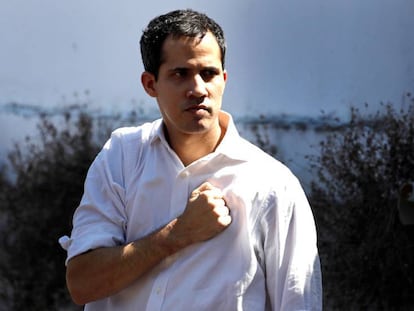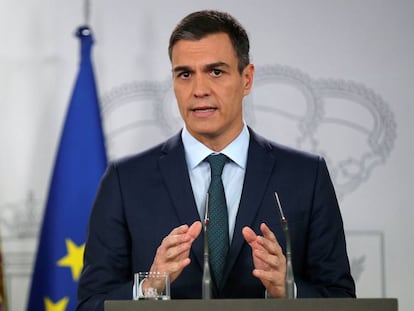Juan Guaid¨®: ¡°There is a lot of fear in the armed forces, a lot of persecution¡±
The opposition leader, recognized as interim president of Venezuela by 50 countries, says that all options are being considered in order to remove Nicol¨¢s Maduro from power
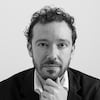
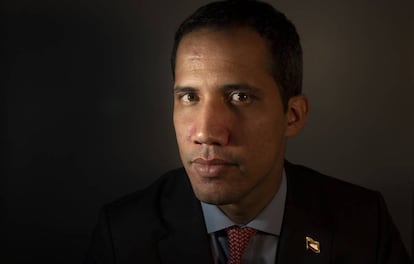
Juan Guaid¨® arrives at a Caracas hotel for an interview with EL PA?S after 8pm on Tuesday. The Venezuelan opposition leader has spent the day zooming across town, where there was a fresh set of protests against President Nicol¨¢s Maduro over a power blackout that lasted over four days, which came on top of serious problems with the water supply.
The 35-year-old leader of the National Assembly, who has been recognized as the interim president of Venezuela by more than 50 world governments, has spent nearly two months trying to dislodge Hugo Ch¨¢vez¡¯s successor from power with help from international pressure. Prosecutors have just launched an investigation into his alleged involvement in the power outage, which the regime considers an act of US-backed sabotage, while the opposition blames it on poor maintenance and corruption.
These days nothing is normal in Venezuela. In a normal country, international aid would have made it through
Guaid¨® also discusses the controversial events of February 23, when a humanitarian aid convoy was stopped at the border between Colombia and Venezuela and protesters faced off with the police. A truck caught fire in the clashes, triggering an exchange of accusations.
Despite the setbacks, Guaid¨®¡¯s ultimate goal remains intact: getting the government to resign, initiating a transition process, and calling free elections. In order to achieve this, he says that ¡°all options¡± should be considered, although he refrains from openly talking about military intervention. The following is a slightly edited version of the original interview in Spanish.
Question. The National Assembly has decreed a ¡°state of alarm¡± in the country. What does this entail, besides its symbolic meaning?
Answer. The state of alarm is the result of a commotion with political causes. Normally, it is declared in situations where you have climate-related catastrophes or natural disasters. But these days nothing is normal in Venezuela. In a normal country, international aid would have made it through. But here, the regime has yet to provide an official technical explanation of what happened [to cause the blackout], and it is accusing a Venezuelan journalist named Luis Carlos D¨ªaz of being behind a cyberattack. This particular crisis is the result of lack of maintenance, of an improper use of the system, and of corruption in contracting. It was the responsible thing to declare a state of alarm. We knew the regime would hit back with a crazy story like this ¨C a cyberattack on an analog computer ¨C precisely to protect itself. We declared the state of alarm to obtain a political, and hopefully technical, response in the short term.
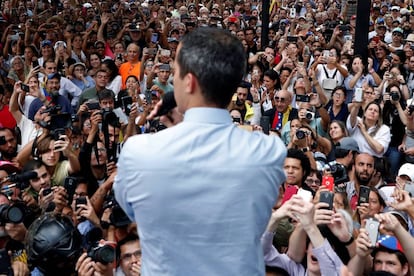
Q. Two weeks after the operation to bring humanitarian aid to Venezuela, a video published in The New York Times showed someone hurling a Molotov cocktail [at the aid convoy] from the Colombian side, and setting a truck on fire.
A. It is difficult for three trucks to burn with just that. And you can clearly see who is blocking the truck, who is using the tear gas canisters, and how after the clashes, a demonstrator decides to respond, frustrated at not being able to get the food through. I think that the arguments used by the regime make no sense, when they used inmates and armed groups to shoot at indigenous people and to block roads used by aid convoys.
Q. In late January, in another conversation with EL PA?S, you were asked if Venezuela did not run the risk of hitting an impasse, a prolonged scenario in which nobody wins and nobody loses. Is that what¡¯s happening?
If we were to hold an election now, it would be similar to the one Maduro held last year
A. We¡¯ve been a part of this process for 20 years, and we have seen the rule of law picked apart, we have seen persecution and suffered it personally. And now, for 40 days, we have been involved in a part of the process that did not happen all by itself. After building a majority, after creating political parties, after winning control of the national parliament, after protesting, making demands, bringing visibility to the crisis, we come to the here and now. And the one who is putting a price on the transition, on social improvements, the one who is blocking the roads, that¡¯s Maduro. He thinks he is winning through false resistance. [¡] They say that armed groups should go out on the streets. That¡¯s a call to hate, to crime. As far as we¡¯re concerned, all this is lost time.
Q. And in the meantime, couldn¡¯t your supporters¡¯ enthusiasm wane?
A. All social processes go through ups and downs. We have experienced this in Venezuela in 2014, 2015, 2016, 2017, 2018 and 2019. It is a very intense process for us, one that did not begin today and will not end until we reach our goal, which is democracy and freedom for our country. Will this come at a cost, will there be risks? Yes, many. Risks to our lives, risk of imprisonment, risks for our families, but that is the process that we Venezuelans have to deal with, and which a generation inherited. I did not vote for Ch¨¢vez, I couldn¡¯t have, I was 15 when they came to power and I watched a country with enormous oil reserves go down the drain. It was very easy to dream of a prosperous Venezuela. But if Venezuelans know anything today, it¡¯s that with Maduro there is no future at all, in fact there isn¡¯t even a present.
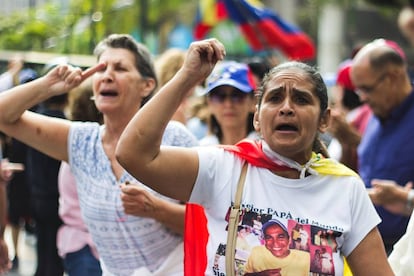
Q. Your constant calls to the armed forces have triggered many defections, but there are no cracks at the top yet. At least, not visibly. Do you still believe this can happen?
A. I believe in Venezuelans first and foremost. And the military are Venezuelans. There is a lot of fear in the armed forces, a lot of persecution. As part of yesterday¡¯s decision [to declare a state of alarm] I have been contacted many times by generals, captains, lieutenants who have told me things like, ¡®We¡¯re with you.¡¯ But there is no clear leadership within the armed forces. There is a fracture when thousands of officials have the courage to stand on the side of the Constitution. Do we expect more? Of course we expect more.
Q. So you think it¡¯s just a matter of time?
A. This is the first time that we have communicated with the armed forces. There were years of separation. The relationship between citizens and the state is very hostile in Venezuela. It is one of either terror or of subsidies, in the best of cases. I was surprised at the degree of backing for a proposed amnesty law; Venezuelans have grasped that we need it, first for change, so the usurpation will end, and later for a transition and so that we can stand on the side of democracy forever.
The one who is putting a price on the transition, on social improvements, the one who is blocking the roads, that¡¯s Maduro
Q. On Saturday, you mentioned Article 187.11 of the Constitution, which authorizes an intervention in Venezuelan territory. You said this would be considered when the time came. What does that mean?
A. We have tried everything in Venezuela. Literally. And always within the bounds of non-violence: through peaceful protests, by exercising our rights, through insistence. But there is also a sense of frustration. How does a Venezuelan defend himself against an armed group? Or against paramilitary groups that are constantly harassing him? Or from a regime that sequesters the armed forces and denies them food and medicine? There is a frank dilemma here regarding citizen protection. [Tennis champion] Garbi?e Muguruza was born in Guarenas-Guatire, and moved to Spain at the age of four or five. Would she have risen to become the world¡¯s top player if she¡¯d stayed in Venezuela? It¡¯s not just the price we are paying today, there¡¯s also the cost of social opportunity. So, for us, the responsible thing to do is to discuss all options.
Q. Do you think a foreign intervention is likely or even possible?
A. Obviously it is a controversial option. If you ask any citizen of the world whether they want war or peace, 99.9% will say peace. There¡¯s no dilemma there. What we want to do, in a responsible way, is to cover all the stages to emerge from a dictatorship and secure all the necessary support to protect our citizens. We must necessarily address it in this manner.
Q. Couldn¡¯t too much of a role by the United States and Donald Trump take away some of your credibility in the eyes of public opinion or in Europe?
A. The first thing I have to acknowledge is the determined position shown by the Trump administration with regard to events in Venezuela. The same goes for Peru, Colombia, Brazil, Paraguay, and the governments of Sebasti¨¢n Pi?era [Chile], Mauricio Macri [Argentina] and Len¨ªn Moreno [Ecuador]. I am grateful to the Trump administration, to Iv¨¢n Duque [Colombia], to Jair Bolsonaro [Brazil], to the members of the European parliament who have spoken out very clearly, to political parties in Spain, to Australia, to Japan, to Morocco, to South Korea. This is not about this country or that country. This is about a clear international acknowledgement of the crisis that Venezuela is going through.
I did not vote for Ch¨¢vez, I couldn¡¯t have, I was 15 when they came to power and I watched a country with enormous oil reserves go down the drain
Q. What do you want from Europe and Spain?
A. From their viewpoint, they have done all that they could. Obviously, we Venezuelans would always like to see one more step, and faster. Our sense of urgency is much greater.
Q. Do you feel that Spain is supporting you?
A. I feel supported by the government... by Spain in general.
Q. Why didn¡¯t you call an election after 30 days, as established by Article 233 of the Constitution that you invoke?
A. If we were to hold an election now, it would be similar to the one Maduro held last year [when most of the opposition declined to participate]. I would run by myself, and that is not an election. For that, we need a transition, we need to build the political factors, we need to re-institutionalize the country. That will make for a real, free election with an impartial arbiter, international observers, and guarantees for all parties. It means the right to vote and be voted, which may sound trivial, but that¡¯s what is being disputed.
English version by Susana Urra.
Tu suscripci¨®n se est¨¢ usando en otro dispositivo
?Quieres a?adir otro usuario a tu suscripci¨®n?
Si contin¨²as leyendo en este dispositivo, no se podr¨¢ leer en el otro.
FlechaTu suscripci¨®n se est¨¢ usando en otro dispositivo y solo puedes acceder a EL PA?S desde un dispositivo a la vez.
Si quieres compartir tu cuenta, cambia tu suscripci¨®n a la modalidad Premium, as¨ª podr¨¢s a?adir otro usuario. Cada uno acceder¨¢ con su propia cuenta de email, lo que os permitir¨¢ personalizar vuestra experiencia en EL PA?S.
En el caso de no saber qui¨¦n est¨¢ usando tu cuenta, te recomendamos cambiar tu contrase?a aqu¨ª.
Si decides continuar compartiendo tu cuenta, este mensaje se mostrar¨¢ en tu dispositivo y en el de la otra persona que est¨¢ usando tu cuenta de forma indefinida, afectando a tu experiencia de lectura. Puedes consultar aqu¨ª los t¨¦rminos y condiciones de la suscripci¨®n digital.
